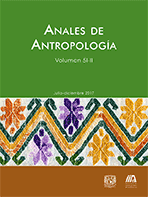Translocality, globalisation and regionalism: how to understand regional Yucatecan gastronomy
Main Article Content
Abstract
Studies on culinary and gastronomic culture have shown a tendency to focus on the emergence and institution of national cuisines. This papertakes a reflective look at the analysis of regional cuisines to grasp the different ways in which these are constituted and instituted during translocalprocesses. Until recently, most social and cultural analyses of global processes have prioritised examining dichotomous relationships betweenthat which is global and local; “local” being understood as subordinate or reactive to “global” processes, and “global” as a homogenizer ofpassive localities. The concept of translocality proposed here seeks to transcend these dichotomies by recognising the existence of cross-sectional,horizontal relationships between cultural practices located within subordinated societies. In discussing Yucatecan gastronomy, this paper examinesthe historically established lateral relationships between Yucatecan society and other societies in the Caribbean, North America and Europe thatenabled a regional cultural gastronomic practice to be constituted and instituted that is different from Mexican cuisine. I intend to explain regionalcuisines that transcend the dichotomous opposition between nation and region by taking into account cross-sectional relations among societiesthat, by mobilizing people, technologies, and cultural practices, produce distinctive gastronomic codes.
Downloads
Article Details
Citas en Dimensions Service
Esta revista usa una licencia CC del tipo CC BY-NC-ND 3.0. Se maneja bajo el esquema de acceso abierto, con una licencia Creative Commons Attribution-NonCommercial-NoDerivs 3.0 Unported.
